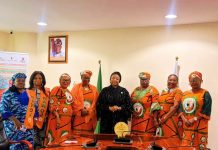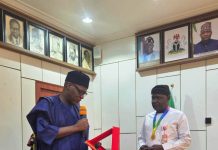The Director General, Institute for Peace and Conflict Resolution, Dr. Joseph Ochogwu has called on stakeholders on climate change, Armed conflicts and Internal displacements in the Sahel Region to amplify their voices in order to chat innovative recommendations towards tackling these challenges affecting the region.
He strongly noted that effective governance structures will change the narrative of the region, adding that sustainable development can only be achieved when there is peace and security.
Dr. Ochogwu made the call at the Seminar on Climate Change, Armed Conflicts and Internal Displacements in the Sahel Region held in Abuja.
Speaking further, the Director General urged the participants to adopt a preventive approach, integrating climate adaptation strategies, peace building frameworks, and ensuring that conflict sensitive policies are inclusive and forward looking.
According to the DG IPCR, “in the Sahel region, this environmental degradation exacerbates existing tensions over land, water and grazing routes and directly fueling intercommunal violence and cross-border instability. Adding that ecological pressure often serves as a catalyst for armed conflict especially in fragile states with weak governance structures and limited adaptation capacities”.
He further disclosed that the most tragic consequences of the intertwined crisis is the massive internally displacement population.”In Nigeria alone, millions have been forced to flee their homes due to the twin scourges of environmental collapse and violent extremism, particularly in the North- East, North Central and Northwest regions,” he added.
He stated that the seminar aligns with President Bola Ahmed Tinubu’s 4D foreign policy doctrine of Democracy, Development, Demography and Diaspora which guides Nigeria’s international engagements and the interconnectivity of regional peace, environmental sustainability and human mobility.
To this end, he admonished the stakeholders to collaborate with the government at all levels to empower communities, especially the women and youths to become agents of change and transformation. Noting that early warning systems, climate smart agriculture, alternative livelihoods and access to justice must form the pillars of a sustainable peace agenda in the Sahel region.
In his remarks, the keynote speaker at the seminar, Ambassador Usman Sarki delved extensively on the causes of climate change and armed conflicts in the region and the past action plans by the government and development partners to tackle these problems, yielding little or no results.
He therefore called on the federal government to work in synergy with the state and local communities to proffer lasting solutions that will curb these menace. He then urged the government to unfold a development plan or agenda targeting the displaced communities, empowering the women and youth in productive skills that will help ameliorate the effect of climate change and armed conflicts in the region.
The seminar was organized to mark IPCR 25 years of existence in collaboration with Friedrich Ebert Stiftung foundation in Nigeria.
Celebrating the Institute For Peace and Conflict Resolution (IPCR) at 25 years of advancing peace building, calling for urgent united action to confront these challenges in the Sahel to avert further crises.
The seminar also brought together stakeholders from the security, academia, MDAs, Civil Societies Organization and the diplomatic missions.
Signed
Josephine Ademu
Head, Information and Public Relations
19th June, 2025.






